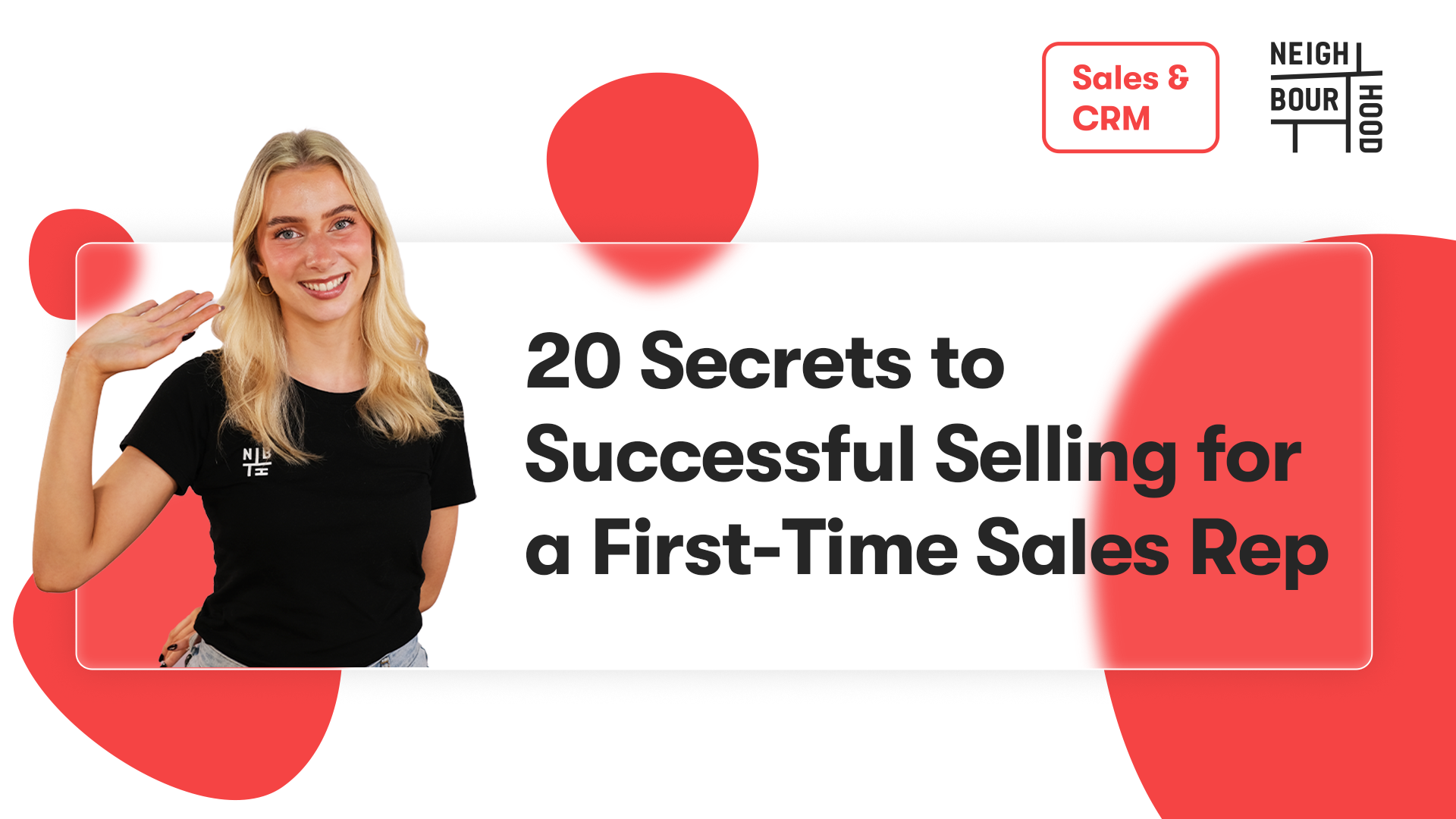Much like interpretive dance on a grand stage or improvised comedy in a rowdy bar - sales is a free-flowing art. But without tact and preparation - is easy to mess up. With many thinking that a job in sales is solely reliant on the number of self-help books you read / number of times you hype yourself up in the mirror daily, and even more of us thinking that you need natural-born charisma to sell anything - it sounds like one we'd rather leave for the Instagram hustlers and self-professed extroverts of the world.
This is where I come in. Because I'm here to tell you that every person is a salesperson - whether they realise it or not. I mean think about it - how many times have you persuaded your kids to finish their vegetables? How many times did you convince your parents to let you have a house party? Ever been on a first date? Guess what ... you spent that awkward hour over a pasta, selling yourself!
The premise is very simple then - great salespeople are made, not born - and selling is a natural part of simply existing. So, let's look at the skills you already have within you, so that when the time comes - you'll know to just turn 'em up!
1. Understand your market
In the same way that you can't DJ without knowing who you're playing for, or send a gift without knowing the address of the receiver - you can't sell without knowing who you're selling to. According to Mark Roberge, the former CRO of HubSpot’s Sales Division, "You know you are running a modern sales team when selling feels more like the relationship between a doctor and a patient and less like a relationship between a salesperson and a prospect."
How often does your doctor pitch "We have this a-mah-zing new procedure I just can't wait to tell you about - it's going to change the g.a.m.e!" That would be weird right? Well, that's what it sounds like when you offer a solution before making a diagnosis!
So get diagnosing! What does a day in their life look like? What challenges do they face? What would make their life easier? Having this knowledge at your disposal will help you improve your understanding of how they can benefit from your solution and enable you to position your offering in a way you know will resonate with them. By answering these questions, it will help you to create your very own buyer persona, that can be used throughout every department in your business, not just for the sales team!
In addition to knowing what makes them tick, you need to know who else is trying to solve them outside of your company. What does the competitive landscape look like? Suss out how the competition is selling and pitching, and then try something different!
2. Focus on the right leads
Leads are the bread and butter of selling - so to make sure you have the best foundation possible, examine what makes leads a good fit for your company so you don't waste your time on people who will never become customers. Start with understanding your market through the help of buyer personas and ideal customer profiles to whittle down what they're struggling with, what their challenges are and how you can align your messaging and offers to their pain points.
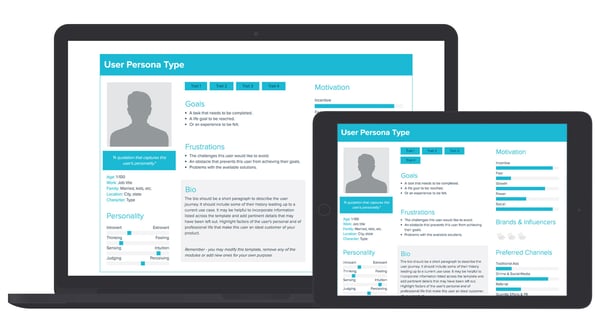
When you focus on the right leads, you'll find that you tend to see better win rates, larger average deal sizes and higher customer lifetime value - because if you're focusing on the people who are best served by your solution - it's easier to close them as customers!
3. Use a measurable, repeatable process
To have the best night out, those of us seasoned to the brutality of the inevitable hangover get into a bit of a routine / process to get the max ROI from getting funky on a Friday = [beans on toast before pre's, regular water breaks, a few hours spare to dance off the giddiness, and a Maccas / panadol / 1L water combo for the uber home - sorted.]
It's the same for the sales world. Using a consistent process every time means that nothing slips through the cracks, allowing you to see the best results possible and adjust your strategy to do even better next time.
4. Know your product
It's a helluvalot easier to be passionate about (and ultimately sell) a product when you genuinely believe in it. In fact, the most effective salespeople actually use their product so they can make up their own mind about its value. The ultimate sales-call cringe-fest is when you know a salesperson blatantly hasn't used the product they're trying to sell you, and their pitch becomes a "let's see how many lies I can squeeze in 15 mins" train-wreck.
E.g. 'While $20,000 might sound a little spenny for a bath, let me reassure you. This is a top o' the range bathtub, I actually use it three times a day! Once in the morning to bathe, once in the afternoon with some bubbles when I get home from work, and then before bed ... you're not going to believe this, but I use it to drink my wine out of! Pretty versatile hey?'. No Salesman Steve, you're stiffing us.
If you're more of a shower guy than a bath lover, don't lie - just find positive testimonials from customers and examples of how your product has improved their lives - in ways both large and small - to reinforce your motivation (and give you valuable social proof when you’re meeting with prospects!)
5. Find shortcuts
Once a great salesperson finds a strategy that works, they use it again and again ... until it stops working. This is smart. In sales, time means money, so the more time you spend experimenting, the less time you have for actually selling. As well as this, there's an opportunity cost. Trying something that doesn't work, means you missed the opportunity to use something that does!
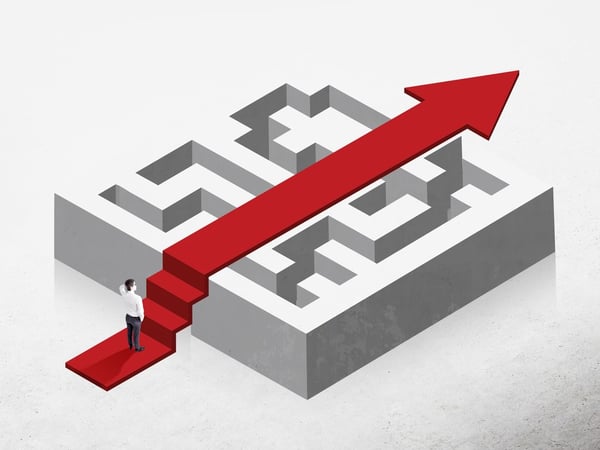
While I am in no way suggesting you never change your approach - change is good! But do so selectively, and get results ASAP so you can either implement the tactic or move on!
6. Practice active listening
While I recommend yoga for many facets of life, the most wonderful benefit for salespeople (as well as becoming extra stretchy) is being present in calls! You're not thinking about other deals, scrolling through your Instagram or sending memes to your co-workers - you're engaged, and as a result, your conversations with buyers are deeper and more meaningful.
It's important to recognise that active listening is one of the hardest skills to develop, since it's literally human nature to care more about what you have to say than what your prospect says. However, being able to is incredibly valuable. Not only will you build stronger relationships, but you'll unlock information that'll help you position your product as the best option.
7. Leverage your CRM
Get familiar with your prospect's digital body language by inspecting how they've interacted with your content through your CRM! Knowing which blogs they've read, what pages they've visited and what emails they've opened can give you a better sense of what they're interested in, what their pain points are and how they came to know about you in the first place can better inform your outreach and conversation starters.
For example, if we saw that someone was reading a blog about conversion strategies, then we can check out how they're converting people on their website currently and then provide personalised input in our initial outreach to demonstrate your understanding of their pain points and illustrates how we can address those challenges.
8. Be data-informed
Let the robots do the heavy lifting for the second time, and pay close attention to your metrics and marketing funnel to find out what's working and what isn't. What's helping your sales team close more deals? What seems to be something they're finding difficult?
Like Shakira [meant] to sing, "the data don't lie" - so trusting the numbers is a critical component to your sales success. We know that data analysis can take a fair wedge out of our free time, so if you're not up to speed in measuring your sales efforts, start with biannual reports and make them as in-depth and detailed as possible. Once you've got that down-pat, you can start doing quarterly ones. The next step in granularity is then ... Yep! You guessed it - monthly. These don't have to be as in-depth as the other two, just look at your sales outcomes from a high level to gain a different perspective and make smarter decisions in the long run!
9. Listen to your prospects
The secret sauce to effective salespeople, is an ability to listen to your prospects. Thanks to social media, we live in what many would describe as a self-centred bubble - so it's important for salespeople to buck the trend and care about your prospects - and not just on the surface level. Let the relationships with your prospects shine through in your conversations, help build trust and ultimately, help you close deals!
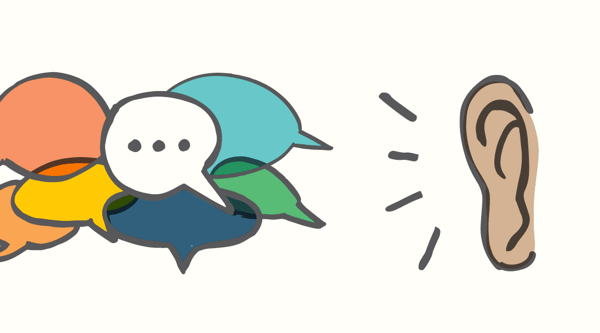
10. Build trust through education
Building trust can be a tad tricky when you're trying to sell someone a product or service - especially after we've all watched The Wolf of Wall Street, and decided that must be how all salespeople operate.
To break the stigma, it's important that you foster relationships and trust with education. In this sense, education refers to any content you have, including blogs, webinars, eBooks or any other helpful content to help educate your prospects on what your organisation offers.
This is where inbound selling comes into it. Don't strong-arm a prospect into a sale right away - let them make their own decision!
It would be all too easy for me to tell you to just send a random blog to any which one of your prospects and cross your fingers and hope they'll froth you for it. To benefit the most from your educational outreach, personalise your efforts. Take a quote from a relevant content offering and apply it to your prospect specifically to provide education, leverage the content you've already got and still be human.
11. Focus on helping
I'm sure it'd be difficult for many of us to count on just one hand how many times we've had a salesperson call us up about a great new service they're offering - we listen politely, but they bang on about the new features of their service for a little too long, and after a while we wonder "How does this actually help me?".
The truth is, features don't help you. What receivers really want to know is ... "how is what you're selling going to solve my problem?". How will your offer address their challenges? This is the differentiation that your prospects are relying on.
If you have a solid grasp on who your buyer personas are, you should be well and truly across their challenges and pain points, and how your solution aligns with that.
12. Roll with rejection
You won't win every deal - sometimes your offer might not be right for them, and other times they're 'just not that into you'. That's part of life, and part of being in sales. While it's important to be thoughtful about how you can improve, it's equally as important to not let it bog you down. Experts suggest viewing rejection as proof you're pushing the limits, so upon your next 'thanks but no thanks', examine why you weren't successful, ask for outside opinions and move on quickly to bigger and better things!
13. Ask for referrals
Successful salespeople know that the easiest deal to close comes from a referral. The social proof is already there, initial outreach is direct, and sales cycles are often heaps shorter. Once you've closed successful business, always ask for a referral and follow up quick-smart with those leads.
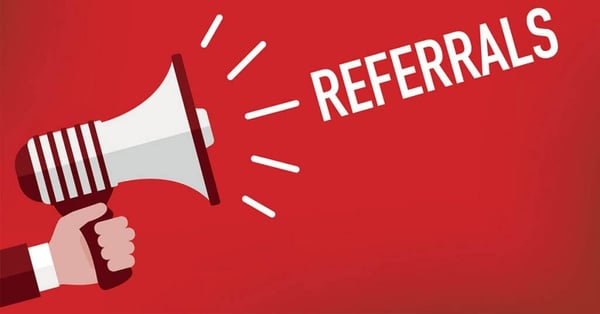
14. Use your marketing team
As we preach daily - align your sales and marketing departments! There's so much these two can learn from each other to help the organisation reach its main goal of generating more revenue - what are prospects saying? Are they responding to a particular piece of content? Did they enjoy a particular webinar? Marketing should enable your sales team to be more successful, so full transparency will help you both be more effective.
15. End each meeting with an action
When you leave your next meeting, don't end by saying "I'll follow up with you on our next steps" - create those next steps right then and there! Don't leave empty-handed, pull up your calendar and book your next meeting on the spot, and you'll see that conversion rate skyrocket!
Extra habits of successful salespeople:
16. Know when to walk away
Are you finding that you're wasting time on deals that leave you feeling a bit flat and are taking a long time to close? Keep tabs on how long your average deal length is and use that as a guideline for how long is too long to spend on one deal. There will of course be exceptions, but if your average sales cycle stretches out for just 45 days and you've been working on a deal for over 90, it's time to re-evaluate.
17. Stay balanced
While life itself is just swings and roundabouts ... a series of peaks of troughs ... salespeople experience Everest-style peaks and Mariana Trench-style troughs in the space of a single week. Some days you feel invincible and other days you wonder whether sales is even right for you (as you nurse a hot choccy and get into your feel-better-soon slippers).
While the weekly emotion is not exactly set in stone, the most successful reps learn to manage their emotions and meet somewhere in the middle. When things are going well, and deals are closing like there's no tomorrow, they remind themselves not to get too cocky. But when business dies down, they tell themselves to keep their heads high and work harder!
18. Take breaks
In sales, results are entirely dependent on activity. The more emails you send, the more meetings you book. The more meetings you book, the more demos you set. The more demos you set, the more sales you close.
Following this continuous cycle, many salespeople often end up working 10 hour days every day and even put in more time on the weekends (shock horror!).
Not only is this detrimental to your mental and physical health, it's hella unproductive. It's important to remember that some of the most brilliant people in the world - LeBron James, Charles Dickens and Charles Darwin prioritised having a balanced schedule.
Breaks aren't for 'half-day Harry's'; they're scientifically proven to boost memory, focus and quality of your ideas. If you're burning the candle at both ends, it's inevitable that you'll eventually burn out. So spend some time with the fam, watch some telly, read a book or walk the dog - do literally anything to give your brain a good break.
19. View your customers' success as your own
Good salespeople don't completely halt work as soon as the prospect signs the ol' dotted line. Don't go full Houdini on them, it's not a good look. Instead, touch base frequently with your customers to seek feedback, provide tactical suggestions or even to see how they're going.
20. Get the right amount of z's
Think you can sell anything on 5 - 6 hours of sleep? While you might be in line for a sales job at RedBull or any Coffee merchant, you need at least 7 - 8 hours of sleep every night, otherwise you could suffer a laundry list of potential ailments, including:
- Irritability
- Lack of motivation
- Anxiety
- Symptoms of depression
- Distractibility
- Reduced energy
- Fatigue
- Restlessness
- Poor decision making
- Increased errors
- Forgetfulness
In short, want to be better at sales? Sleep on it.
And that, boys and girls, are our 20 secrets for getting you in ship-shape for selling more successfully. Remember, selling isn't a dark art only a select few have been let in on. Anyone can be a good salesperson - you're already an expert in your industry, so start acting like one!

